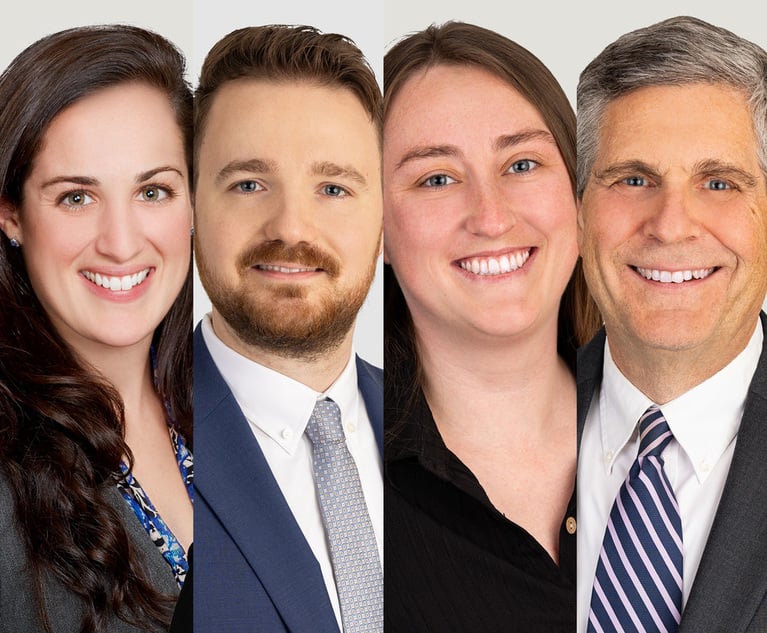 Total Look Salon & Spa, Southport. Courtesy photo
Total Look Salon & Spa, Southport. Courtesy photoSwanky Salon Sued for Allegedly Snipping Stylists' Overtime Pay
Southport-based Total Look Salon & Spa has been hit was a lawsuit claiming it did not pay dozens of employees for overtime and time spent attending meetings and training sessions.
November 01, 2018 at 11:47 AM
4 minute read
The chief executive officer and president of a upscale Southport salon has been slapped with a prospective federal class action lawsuit alleging she didn't pay workers for training and staff meetings. The lawsuit also alleges workers often put in more than 40 hours weekly and were not paid time-and-a-half for the overtime, as required by law.
The amended lawsuit, which was filed in the U.S. District Court for the District of Connecticut on Tuesday, alleges Cher Anderson, the principal owner of Total Look Salon & Spa, had about 12 hours of training for employees a month, but didn't pay for that time. In addition, employees were required to spend about one hour a week working on training assignments, usually on mannequins, for no pay.
The staff meetings were less frequent and occurred about four times a year, according to Gary Phelan, an attorney for former employee and assistant stylist Nicole Johnson, a named plaintiff in the putative class action. Johnson worked for the salon for 18 months before being constructively discharged in March.
The salon is accused of violating the Fair Labor Standards Act and the Connecticut Minimum Wage Act. The state Department of Labor states employees must be paid for things such as training and staff meetings if those events are mandatory. While the company claims in its written policy that the meetings are voluntary, Phelan says it is clear they are really mandatory.
“The training was an integral part of employment at the hair salon.” said Phelan, a shareholder at Stratford-based Mitchell & Sheahan. “It will, though, be the burden of the employee to prove it was not voluntary.”
The lawsuit cites comments by Anderson, under oath, at a Connecticut Department of Labor unemployment appeal hearing in July as proof the employee training was not voluntary.
According to the complaint, Anderson said, “If they want to advance with the company, it's highly advisable that they attend the classes.” That statement, Phelan said, makes it clear that employees were frowned on for not attending training.
As for staff meetings, Phelan said employees “needed to get permission not to attend. There was pressure to attend.”
Anderson did not respond to a request for comment Thursday, and the salon had not assigned an attorney to the matter by press time.
The lawsuit cites two prospective classes, both of which are very similar and could overlap. They are the FLSA class and the Connecticut class. Both classes includes those employed since Sept. 27, 2012. The Connecticut class also includes those who were subject to the salon's written policies since Oct. 30, 2016. The latter revolves around the company's alleged pay secrecy policy in which employees are prohibited from discussing their compensation with their peers. But, Phelan said, in July 2015 Connecticut passed the Connecticut Pay Equity and Fairness Law, which prohibits employers from discriminating against employees for disclosing their salaries to colleagues.
The company's pay secrecy policy was written before July 2015, but Phelan said the salon never changed it after the law was enacted.
In total, Phelan said there are probably about 50 people in both classes. He estimated the lawsuit will be seeking “about $1 million for the classes, including attorney fees.” It's estimated, Phelan said, that Johnson is entitled to an additional $75 per week, or about $6,500 in unpaid wages, for her time at the salon.
The lawsuit is also fighting claims by the salon that Johnson owes the business $1,246 for, among other things, educational costs and paid vacation days.
Attorney Reese Mitchell assisted Phelan on the case.
The matter will be heard before Judge Robert Chatigny in Hartford.
This content has been archived. It is available through our partners, LexisNexis® and Bloomberg Law.
To view this content, please continue to their sites.
Not a Lexis Subscriber?
Subscribe Now
Not a Bloomberg Law Subscriber?
Subscribe Now
NOT FOR REPRINT
© 2024 ALM Global, LLC, All Rights Reserved. Request academic re-use from www.copyright.com. All other uses, submit a request to [email protected]. For more information visit Asset & Logo Licensing.
You Might Like
View All
Managing Partner Vindicated in Disciplinary Proceeding Brought by Former Associate
5 minute read
Connecticut Movers: Year-End Promotions, Hires and an Office Opening
5 minute read
GC Pleads Guilty to Embezzling $7.4 Million From 3 Banks

Trending Stories
- 1Decision of the Day: Judge Reduces $287M Jury Verdict Against Harley-Davidson in Wrongful Death Suit
- 2Kirkland to Covington: 2024's International Chart Toppers and Award Winners
- 3Decision of the Day: Judge Denies Summary Judgment Motions in Suit by Runner Injured in Brooklyn Bridge Park
- 4KISS, Profit Motive and Foreign Currency Contracts
- 512 Days of … Web Analytics
Who Got The Work
Michael G. Bongiorno, Andrew Scott Dulberg and Elizabeth E. Driscoll from Wilmer Cutler Pickering Hale and Dorr have stepped in to represent Symbotic Inc., an A.I.-enabled technology platform that focuses on increasing supply chain efficiency, and other defendants in a pending shareholder derivative lawsuit. The case, filed Oct. 2 in Massachusetts District Court by the Brown Law Firm on behalf of Stephen Austen, accuses certain officers and directors of misleading investors in regard to Symbotic's potential for margin growth by failing to disclose that the company was not equipped to timely deploy its systems or manage expenses through project delays. The case, assigned to U.S. District Judge Nathaniel M. Gorton, is 1:24-cv-12522, Austen v. Cohen et al.
Who Got The Work
Edmund Polubinski and Marie Killmond of Davis Polk & Wardwell have entered appearances for data platform software development company MongoDB and other defendants in a pending shareholder derivative lawsuit. The action, filed Oct. 7 in New York Southern District Court by the Brown Law Firm, accuses the company's directors and/or officers of falsely expressing confidence in the company’s restructuring of its sales incentive plan and downplaying the severity of decreases in its upfront commitments. The case is 1:24-cv-07594, Roy v. Ittycheria et al.
Who Got The Work
Amy O. Bruchs and Kurt F. Ellison of Michael Best & Friedrich have entered appearances for Epic Systems Corp. in a pending employment discrimination lawsuit. The suit was filed Sept. 7 in Wisconsin Western District Court by Levine Eisberner LLC and Siri & Glimstad on behalf of a project manager who claims that he was wrongfully terminated after applying for a religious exemption to the defendant's COVID-19 vaccine mandate. The case, assigned to U.S. Magistrate Judge Anita Marie Boor, is 3:24-cv-00630, Secker, Nathan v. Epic Systems Corporation.
Who Got The Work
David X. Sullivan, Thomas J. Finn and Gregory A. Hall from McCarter & English have entered appearances for Sunrun Installation Services in a pending civil rights lawsuit. The complaint was filed Sept. 4 in Connecticut District Court by attorney Robert M. Berke on behalf of former employee George Edward Steins, who was arrested and charged with employing an unregistered home improvement salesperson. The complaint alleges that had Sunrun informed the Connecticut Department of Consumer Protection that the plaintiff's employment had ended in 2017 and that he no longer held Sunrun's home improvement contractor license, he would not have been hit with charges, which were dismissed in May 2024. The case, assigned to U.S. District Judge Jeffrey A. Meyer, is 3:24-cv-01423, Steins v. Sunrun, Inc. et al.
Who Got The Work
Greenberg Traurig shareholder Joshua L. Raskin has entered an appearance for boohoo.com UK Ltd. in a pending patent infringement lawsuit. The suit, filed Sept. 3 in Texas Eastern District Court by Rozier Hardt McDonough on behalf of Alto Dynamics, asserts five patents related to an online shopping platform. The case, assigned to U.S. District Judge Rodney Gilstrap, is 2:24-cv-00719, Alto Dynamics, LLC v. boohoo.com UK Limited.
Featured Firms
Law Offices of Gary Martin Hays & Associates, P.C.
(470) 294-1674
Law Offices of Mark E. Salomone
(857) 444-6468
Smith & Hassler
(713) 739-1250










